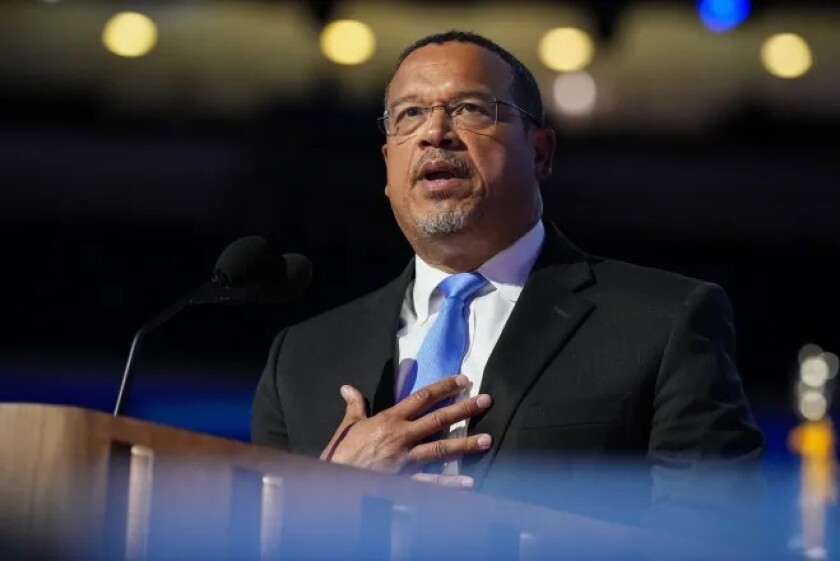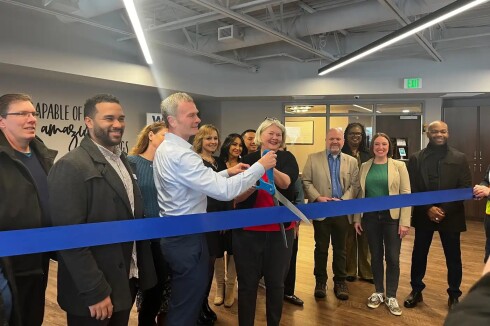ST. PAUL — The Minnesota Legislature kicked off its third week on the same note: drama. Different this week, though, the Senate instead of the House was stirring the pot as they attempted to expel Sen. Nicole Mitchell , DFL-Woodbury, over her burglary charge.
But the House continued to beat the drama drum. For four days, Republicans filled the seats in their half of the House floor and drafted motions to compel Democrats to show up or to halt Democrat salaries, but Secretary of State Steve Simon adjourned before these motions could be heard. Republicans pushed back, suing Simon on Friday for “overstepping .”
ADVERTISEMENT
As the Senate reverts out of power-sharing and the House remains in deadlock, here’s a look beyond the storm cloud that continues to loom over the Legislature: public safety, session priorities and responses from lawmakers on Trump’s federal freeze.
House Republicans pitch public safety efforts
While House Republicans are not allowed to introduce bills following the Supreme Court’s ruling on Friday, Jan. 24 ordering that 68 is a quorum , Republicans held a press conference on Wednesday, Jan. 29 outlining their plans to address public safety across the state.

Some of these key provisions include 10-year sentences for first-degree sex trafficking, increased penalties for fleeing a police officer in a reckless manner, changing the charge for assaulting a peace officer from a gross misdemeanor to a felony and providing more transparency on charging and dismissal decisions as well as court sentencing departures.
“During my last five years in the House, I have witnessed the devastating consequences of soft-on crime policies,” Rep. Paul Novotny, R-Elk River, said. “These policies have tied the hands of law enforcement, emboldening criminals and have made our communities less safe. Today, we are here to say enough is enough.”
Senate Republicans urge 'Minnesota First'
Senate Republicans pitched their session priorities on Thursday in what they called a “Minnesotan’s first” agenda.
ADVERTISEMENT
The priorities address the cost of living, stopping tax increases, addressing fraud, increasing public safety, and putting students first. Some of the bills proposed to achieve these priorities: Exempt tip income from state taxes, Statewide Office of the Inspector General, Eliminate free college and healthcare for non-citizens, authorizing local school boards to waive state mandates and repealing the Minnesota Rehabilitation and Reinvestment Act.

“On all the chaos that you hear in down here at the Minnesota State Capitol over the last few weeks, we wanted to make sure that folks back at home were aware and know that we are focusing on the needs of Minnesotans first,” Senate Leader Mark Johnson, R-East Grand Forks, said. “For the last two years, Democrats have put government and their political allies first and passed the costs on hard-working Minnesotans. Minnesota's first agenda puts hard-working Minnesotans at the front of the line.”
Senate Republicans will soon revert to the minority as Senator-elect Doron Clark of Minneapolis is sworn in, giving Democrats a 34-33 majority. The transition will take place after Clark's special election victory is certified, expected sometime next week.
This means Republicans will need at least one Democrat vote to pass any of the bills on their agenda. The Senate “Blue-dog” caucus emerged on Dec. 12 as a group of Democrats who vowed to work across the aisle, but Johnson voiced skepticism that the votes would come through.
“For the last two years, as you're aware, there have been many, many votes that have been passed on a strictly party-line basis with Democrats controlling the agenda,” Johnson said. “Each one of those blue dog members, the eight that have put up their hands and said, ‘We're going to work in a bipartisan manner,’ have not been doing that over the last eight years. So I do not believe that that's going to happen. They can talk about it. They can write up press releases, but to me, it's not worth the paper it's written on until there's action behind that”
Lawmakers weigh in on Trump’s funding freeze
After Trump issued a federal funding freeze on Monday, Jan. 27, Gov. Tim Walz, Lt. Gov. Peggy Flanagan and Attorney General Keith Ellison spoke out on Tuesday. Jan. 28 against the potential harm they see for Minnesotans. But Minnesota lawmakers also weighed in on the matter.
ADVERTISEMENT
Walz called attention to cuts to federally funded Human Services as well as cuts to federally funded police training, but Republicans responded to the freeze by pointing to areas of the budget where Walz had cut spending .
“When you look at the core programs — Medicare, Medicaid — those funding streams from what the agencies are telling us have been unaffected,” Sen. Jordan Rasmussen, R-Fergus Falls, said at Thursday’s press conference. “But what we do know is what the governor's budget has proposed, which is cuts for nursing homes, cuts for Disability Services.”
Rep. Novoty at the House Republicans conference on Wednesday similarly called out at Walz cutting $6 million in state spending for police, despite his office making recent investments in police training across the state.
But Democrats took a different tone to the freeze, Senate Leader Erin Murphy, DFL-St. Paul called Trump’s freeze a “radical authoritarian power grab of the United States’ budget.”
"Long term, if cuts of even a fraction of this magnitude were implemented, the costs to individuals and families would be devastating,” Murphy said. “In Minnesota, we have worked hard to balance a budget that prioritizes the needs of our people. This extreme executive order throws our existing and future budgets into jeopardy. The fact that Trump took this chaotic action while simultaneously firing inspectors general across federal agencies is reckless.”
Bills: 900 and counting
S.F.431 : A tax break for volunteer firefighters and rescue workers to subtract $10,000 from their state taxable income, and $20,000 for married couples if both spouses qualify.
ADVERTISEMENT
S.F.743 : Requiring rulemaking to relax child care staff-to-child ratios for smaller communities.
S.F.744 : Prohibiting therapies and procedures for the treatment of “gender dysphoria” for minors.
S.F.746: Requiring peace officers to be United States citizens.
S.F.614: Providing an exemption for all school supplies from sales and use tax.
S.F.640 : Classifying election judge party affiliation as public data.
S.F.662 : Establishing a civil cause of action for the non-consensual removal of a condom, with penalties.
S.F.671: Increasing minimum wages gradually to $20 by 2029.
ADVERTISEMENT
S.F.191: Adding a heightened penalty for fleeing a peace officer in a motor vehicle in a culpably negligent manner.
S.F.757: Legalizing sports betting in Minnesota.
After the Supreme Court’s order that 68 members constitute a quorum of the House, House Republicans are no longer able to conduct House business, including introducing bills.












